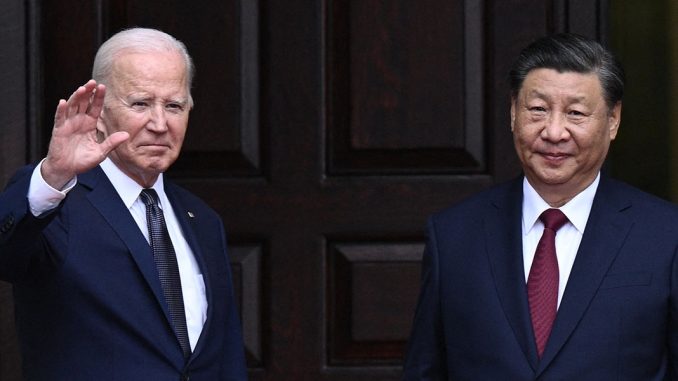
It’s no secret that China subsidizes its own companies to dominate the global markets in rare earth and critical minerals.
This dominance is both an economic and national security issue for America and her allies because these minerals are crucial not only for producing electronics and renewable energy technologies but also for the defense industry.
Yet, as the world becomes increasingly dependent on these minerals, the Biden administration panders to those who oppose mining rather than use America’s domestic resources in this new Cold War.
For starters, China has a virtual monopoly on rare earth elements because it controls 38% of the global rare earth reserves, 60% of rare earth mining, 85% of rare earth processing, and 90% of the manufacturing of rare earth permanent magnets. These high-powered rare earth magnets, often neodymium-iron-boron magnets, are used in 76% of offshore wind turbines and 32% of land-based ones.
What’s more, China controls 80% of both the world’s solar and electric vehicle battery production.
This makes three green-centric industries dependent on Communist China’s geopolitical whims.
According to the U.S. Geological Survey, China is the leading country in producing critical minerals such as antimony (55%), bismuth (80%), fluorspar (69%), gallium (98%), graphite (65%), indium (59%), magnesium (90%), tellurium (53%), tin (31%), titanium (58%), tungsten (85%), and vanadium (70%).
Whether it is mining, processing, or forging, China has placed itself strategically into these vital industries to leverage other countries to suit its interests and authoritarian preferences.
The environmental consequences of China’s dominance are equally worrying. Leeching ponds used in the extraction process in China produce a staggering 2,000 tons of toxic waste for every ton of rare earths.
Not only does this tarnish the “green” credentials of many technologies so proudly flaunted by advocates, it wreaks havoc on local environments and communities. Because China refuses to line leeching and tailing ponds, toxic water from rare earths is slowly approaching the Yellow River, the main source of drinking water for millions of Chinese.
America shouldn’t be surprised that China flexes its rare earth muscles. Back in 2010, a dispute over a Japanese fishing trawler metastasized into China’s levying an embargo on rare earths bound for Japan. Consequently, Japan took the prudent solution of diversifying supply chains so that it could better survive future shocks.
Mountain Pass in California, however, America’s single rare earth mine, shut down in 2002 and only recently was brought back online. Today, that mine produces about 15% of global rare earths.
Unfortunately, the Biden administration has held up several critical mineral projects this year alone. In January, the Environmental Protection Agency blocked development of a proposed billion-dollar copper- and gold-rich Pebble Mine in Bristol Bay, Alaska, ostensibly to protect the fishing rights of 68 Native Americans.
That same month, the Environmental Protection Agency blocked Twin Metals, a proposed copper and nickel mine in Minnesota, with a 20-year moratorium despite the looming closure in 2025 of the last U.S. nickel mine. U.S. District Judge Christopher Cooper rejected Twin Metals’ appeal in September. Twin Metals has appealed to the U.S. Court of Appeals for the District of Columbia.
In May, the EPA lobbied against Polymet’s NewRange Copper Nickel mine in Minnesota, citing mercury being released into rivers. However, Polymet contended that mercury levels actually would be lower because the company would clean up a waste water pond from a defunct iron mine.
The Army Corps of Engineers bowed to the EPA, though, and the next month ruled against allowing the NewRange mine.
In August, President Joe Biden used the 1906 Antiquities Act to declare unilaterally that about 1 million acres of public lands in northern Arizona would become a national monument, blocking extraction of uranium. Considering that America produces only 5% of its own uranium and imports 60% from Russia, Kazakhstan, and Uzbekistan, these moves reek of pandering to green mining opponents rather than securing America’s future.
Finally, in October, the Biden administration blocked a road connecting Dalton Highway to the Ambler mining district in northwest Alaska, citing concerns about the impact on Native American communities.
Instead of constantly blocking U.S. supply chains, Biden should allow projects with lawful environmental safeguards to continue. In addition, the president should focus on innovative approaches, such as research in Florida aimed at extracting rare earth elements in the production of fertilizer.
Allowing investments in Montana’s Sheep Creek site, which holds the world’s purest concentration of rare earths at almost 90,000 parts per million, also could help decouple America from China.
In an era when economic might increasingly is tied to technological prowess, surrendering control over strategic resources such as rare earths and critical minerals is short-sighted at best and reckless at worst.
The path forward is clear. America needs a comprehensive strategy for rare earth minerals that doesn’t subject companies to political vacillation, balances economic concerns with legitimate environmental concerns, and provides for the nation’s national security interests.
Have an opinion about this article? To sound off, please email letters@DailySignal.com and we’ll consider publishing your edited remarks in our regular “We Hear You” feature. Remember to include the URL or headline of the article plus your name and town and/or state.

